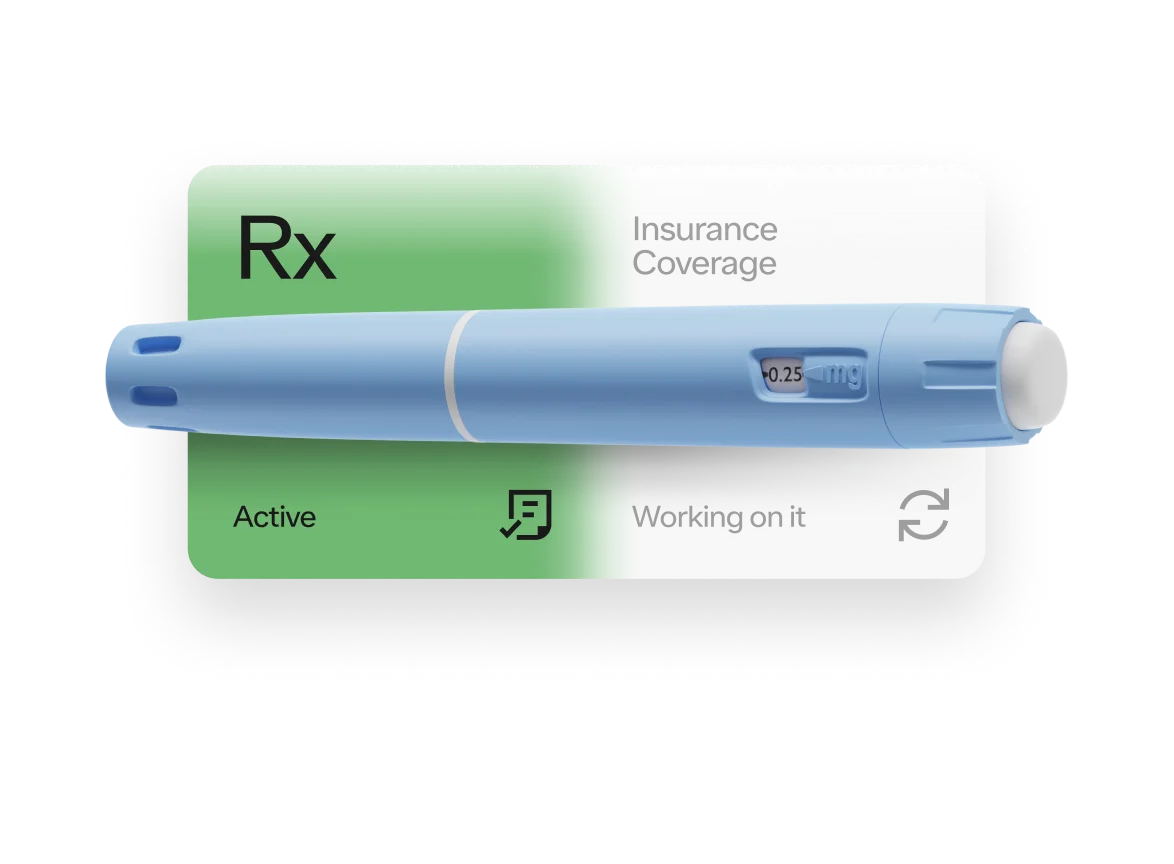Key takeaways
Blue Cross Blue Shield may or may not cover Ozempic and can depend on your individual plan’s prescription drug coverage, as well as what you are taking Ozempic to treat.
Prior authorization is usually required to get insurance coverage for Ozempic.
Here's what we'll cover
Key takeaways
Blue Cross Blue Shield may or may not cover Ozempic and can depend on your individual plan’s prescription drug coverage, as well as what you are taking Ozempic to treat.
Prior authorization is usually required to get insurance coverage for Ozempic.
Given its benefits for type 2 diabetes, weight loss, and more, Ozempic (semaglutide) is a highly sought-after medication. However, it’s also expensive, with an almost $1,000 per month out-of-pocket price tag.
Getting insurance coverage for Ozempic isn’t as clear-cut as some other medications, and can depend on what you’re taking it for as well as your plan’s specific coverage options. Here’s what you need to know about whether Blue Cross Blue Shield (BCBS) covers Ozempic.
Ozempic Important Safety Information: Read more about serious warnings and safety info.
Does Blue Cross Blue Shield cover Ozempic?
“It depends on the specific plan, which is negotiated between the employer and the payer,” shared Dr. Beverly Tchang, MD, an endocrinologist who treats patients with obesity, and is an advisor to Ro. Ultimately, whether BCBS covers Ozempic isn’t a straightforward answer. It can depend on several factors, from your plan’s specific coverage details to whether you’re taking it for type 2 diabetes or off-label for weight loss.
How to determine if Blue Cross Blue Shield covers Ozempic?
BCBS is a network of over 60 independent insurance companies and licensees, including Blue Cross, Blue Shield, Blue Cross and Blue Shield, Anthem, Highmark, CareFirst, and others. Each of these has its own unique policies and coverage options—which can be updated at any time. Several factors can determine if your specific BCBS plan covers Ozempic, and how easy (or cheap) it is to get Ozempic.
Diagnosis
Insurance coverage for Ozempic may depend on whether your diagnosis, meaning the medical condition identified by your healthcare provider, aligns with the specific uses the FDA has approved the drug to treat.
If an insurer covers a medication, it’s typically for their FDA-approved indications, shared Dr. Tchang. In the case of Ozempic, that means type 2 diabetes. Ozempic’s FDA-approved indications are to improve blood sugar control in people with type 2 diabetes, or to reduce cardiovascular risk in people with type 2 diabetes and heart disease.
Ozempic is not FDA-approved for weight loss. So, when healthcare providers prescribe Ozempic for weight loss, they are doing so off-label (meaning that it’s being prescribed for a condition other than the FDA-approved indication). Off-label prescriptions are a lot less likely to be covered by insurance plans, including those offered by Blue Cross Blue Shield.
There is another medication made by Novo Nordisk that contains the same active ingredient (semaglutide) as Ozempic: Wegovy. Wegovy is FDA-approved for weight loss, so some insurance plans, including BCBS, may be more likely to cover Wegovy for weight loss vs. Ozempic.
Wegovy Important Safety Information: Read more about serious warnings and safety info.
Drug tier
Like other insurance plans, BCBS organizes its list of covered drugs, also known as a formulary, into several tiers. BCBS drug tiers may include:
Tier 1: Preferred generic drugs
Tier 2: Generic drugs
Tier 3: Preferred brand drugs
Tier 4: Non-preferred brand drugs
Tier 5: Specialty drugs
Tier 6: Non-preferred specialty drugs
Or, your plan’s list of drug tiers might be simpler, such as:
Tier 1: Generic drugs and low-cost, preferred-brand drugs
Tier 2: Non-preferred generic drugs or preferred brand drugs
Tier 3: Non-preferred brand drugs or drugs that usually have a cheaper equivalent on a lower tier
Tier 4: Specialty drugs
If that all feels like a lot of mumbo jumbo, welcome to the wonderful world of prescription drug coverage! Here’s the key thing you need to know: the higher the tier, the higher the cost. In other words, you’ll usually pay more for a Tier 4 drug than a Tier 1 drug.
Ozempic typically falls somewhere in the middle. It’s a Tier 3 Preferred Brand drug on the BlueMedicare PPO Enhanced plan offered by BlueCross BlueShield of North Carolina. Meanwhile, it’s a Tier 2 Preferred Brand drug on various HMO and PPO plans offered by Blue Shield of California.
Prior authorization
Some insurance plans don’t cover certain medications outright; they require prior authorization. That means you’ll need to work with your healthcare provider to submit paperwork to BCBS requesting that they cover Ozempic.
“Prior authorizations vary from one insurance plan to the next; it may be one question long or two pages long,” shared Dr. Tchang. “Usually a document needs to be filled out by the prescriber or the prescriber's staff that confirms the patient's eligibility for the medication.”
BCBS typically requires prior authorization for Ozempic. You can check if your specific plan does by reviewing your plan’s drug formulary. If you see a “PA” next to Ozempic, that means prior authorization is required.
It’s worth noting that submitting the paperwork doesn’t always result in approval. Your BCBS insurance plan may choose to deny your request and not cover Ozempic, leaving you paying out of pocket for the medication. But, if they do deny it, you can always try again and submit an appeal.
How much does Ozempic cost?
The list price of Ozempic is $1,027.51 for a 30-day supply, according to Novo Nordisk, the maker of Ozempic. However, the list price is set by the manufacturer, and you may pay more—or less—depending on your insurance coverage, the pharmacy you use, and whether you’re eligible for any Ozempic coupons or savings programs.
How to check whether your BCBS plan covers Ozempic
Checking whether your BCBS plan covers Ozempic can take a little effort. You can review your plan’s drug formulary, but these get updated regularly, and may even change from month to month. Check the date on the formulary to make sure you are looking at the most recent version. You can also contact your BCBS plan directly and ask them.
Novo Nordisk offers a free tool to check insurance coverage for Ozempic through their NovoCare program. You can call 1‑844‑Novo4Me (1‑844‑668‑6463) or fill out the online form here and an agent will get back to you with the coverage information they found. The service is available weekdays from 8 a.m.–11 p.m. and Saturday from 11 a.m.–7 p.m. Eastern Time. Have your insurance card handy.
If you are prescribed Ozempic through the Ro Body Program, Ro’s insurance concierge offers a similar service. They will verify your benefits through BCBS and work with your BCBS provider to get Ozempic covered for weight loss.
If you can’t receive coverage for Ozempic through your BCBS plan, don’t despair. They may cover an alternative medication instead, such as Mounjaro (tirzepatide), Trulicity (dulaglutide), or metformin. Review your coverage options and talk with your healthcare provider to see what your best next steps are.
Mounjaro Important Safety Information: Read more about serious warnings and safety info.
DISCLAIMER
If you have any medical questions or concerns, please talk to your healthcare provider. The articles on Health Guide are underpinned by peer-reviewed research and information drawn from medical societies and governmental agencies. However, they are not a substitute for professional medical advice, diagnosis, or treatment.
References
BlueCross BlueShield (2024). BCBS Companies and Licensees. Retrieved Jul. 12, 2024 from https://www.bcbs.com/bcbs-companies-and-licensees
BlueCross BlueShield of North Carolina. (2024). 2024 Comprehensive Formulary. Retrieved Jul. 12, 2024 from https://www.bluecrossnc.com/content/dam/bcbsnc/pdf/members/medicare/prescription-drug-resources/formulary-guides/blue-medicare-ppo-enhanced-24.pdf
Blue Shield of California (2024). Standard Drug Formulary: July 2024. Retrieved Jul. 12, 2024 from https://blueshieldca.adaptiverx.com/web/pdf?key=8F02B26A288102C27BAC82D14C006C6FC54D480F80409B6815F2507720EA042A
NovoCare-a. (2024). Find out if your insurance covers Ozempic. Novo Nordisk. Retrieved Jul. 12, 2024 from https://www.novocare.com/diabetes/products/ozempic/check-coverage.html
NovoCare-b. (2024). Find out the cost for Ozempic. Novo Nordisk. Retrieved Jul. 12, 2024 from https://www.novocare.com/diabetes/products/ozempic/explaining-list-price.html
US Food & Drug Administration (FDA). (2023). Highlights of Prescribing Information: Ozempic (semaglutide) injection, for subcutaneous use. Retrieved Jul. 12, 2024 from https://www.accessdata.fda.gov/drugsatfda_docs/label/2023/209637s020s021lbl.pdf













